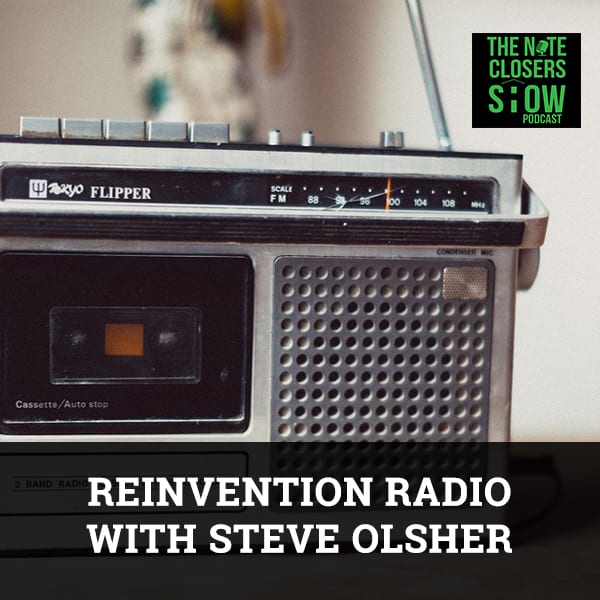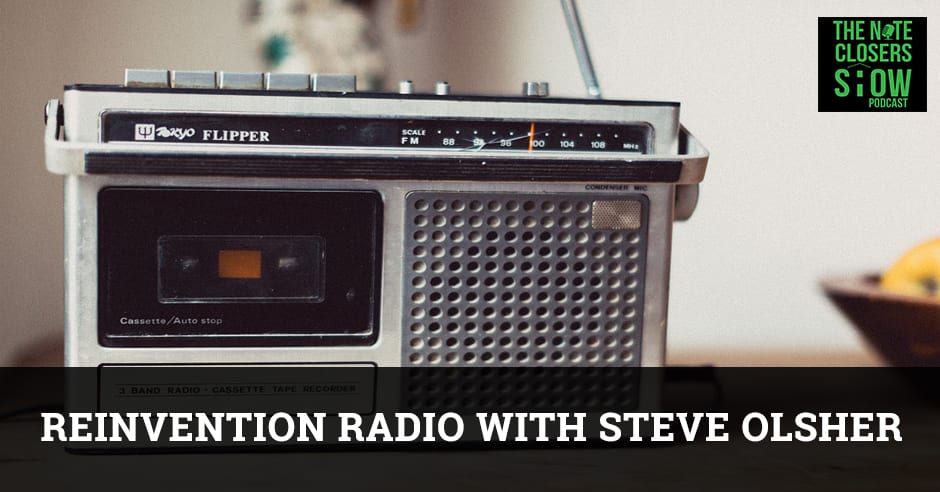
—
Listen to the podcast here
Reinvention Radio with Steve Olsher
I’m jacked up to have our buddy, Steve Olsher, on who is the Master of Reinvention. He’s the host of two amazing podcasts and an absolutely amazing figure in the marketing and the podcast field up there. He’s the host of two amazing shows: Beyond 8 Figures Podcast and Reinvention Radio. Thanks for joining us. Steve, you’ve done a great job in the last few years and even beyond that. We all have peaks and valleys. We all go through ups and downs. You’ve done an amazing of being truly the master of reinvention. They’ve written articles about you on being able to help reinvent yourself and pivot in the industry. I want you to share a little bit about your background with our audience.
I am the poster child for reinvention. That’s why the moniker that I’ve been using for about the past years is America’s Reinvention Expert. I do help people reinvent their personal lives, help businesses reinvent their focus, their ability to monetize, generate revenue, etc. From an entrepreneurial perspective and almost every pass, I’ve changed gears from nightclubs, being a DJ to owning my own nightclub, to then getting involved in catalogs and early in the online space. We launched on CompuServe’s Electronic Mall in 1993. A fully functioning eCommerce site that we built out in 1995, which became Liquor.com in 1998. Real estate development developed over $50 million in property over about a dozen years or so. Then writing, speaking, coaching, podcasting, hosting live events like the one you joined us at the New Media Summit. I am the personification of the word reinvention.
That’s the reason we have you on here. You’ve done a great job of pivoting, changing and reinventing yourself, going with whatever the hot thing is. Maybe not the hot thing but the thing that you could make the most amount of impact on. We have so many of our audience who are going through some reinvention. They’re transitioning out of a job. They want to be more real estate entrepreneurs or they’re looking to leave some of that. Some of them they pursue a passion or use real estate investing to help them fund their passions, travel, retirement or things like that. You’ve talked to so many amazing people, especially on Beyond 8 Figures Podcast. It is such an awesome show. I want you share a little about the show, Steve.
We’ve got a couple of shows. I’ve been doing Reinvention Radio since 2009. I took a little bit of time off and then back at it full-time since 2015. Full-time, meaning I consistently put out episodes for Reinvention Radio. On that show, we feature people who have reinvented their lives. Either they were doing X and now they’re doing Z or they’re reinventing a particular industry or something of that nature. Lots of interesting folks join us on that show and it runs the gamut. Every show’s got a theme, reinventing fear, marketing, real estate, you name it. We’ve covered it over the years. Beyond 8 Figures is our newest show that we just launched not terribly long ago. On that show, we exclusively sit down with entrepreneurs who have either exited for more than $10 million or currently run businesses that generate more than $10 million annually. We’ve had people like Naveen Jain, who’s a billionaire. Reid Tracy, the President, and CEO of Hay House. They do over $100 million a year. Christopher Lochhead with $4.5 billion exit with Mercury Interactive. Lots of folks that you’ve never heard of who are quietly crushing it in these industries that you don’t think are very glamorous or sexy. $50 million here, $30 million there and it’s crazy. It’s amazing to hear about all of the different ways that you can get to eight figures and beyond.
I’m sure you’ve identified a couple of things. You’ve probably heard something consistently throughout. Is there a lesson that you’ve learned or taken away from your guest on the show that maybe surprised you or you didn’t think about?

Reinvention Radio: You can’t get to eight figures doing what you did to get to seven figures.
A few things. What comes to mind first is you can’t get to eight figures doing what you did to get to seven figures. You almost have to break everything. I don’t want to say start over because you don’t want to kill the business. You have to break everything from the standpoint in terms of how you operate the business. It’s been famously said since Michael Gerber coined this whole concept of working in your business versus working on your business. To get to seven figures, you’re probably working in your business as some technician, execution, etc. You’re involved with it but to get to eight figures and beyond, you have to lean on the team. You can’t do it alone. That’s the biggest thing. Trust is what comes into play there. You have to trust your instincts that you’re making the right decisions. You have to trust your people. You also have to trust the fact that you want to build a business of that size. On a lot of levels, it’s much easier to run a solid six-figure, seven-figure business that generates decent revenue and income for you than to run an eight-figure business. To run an eight-figure business is no small feat. You’ve got to remember do you want to do that? On paper, it seems glamorous, “I love to have a $10 million-plus business.” In reality, it completely changes the scope of perhaps why you got into the business in the first place.
I’m a big believer that if you haven’t gone from making six figures to seven figures, you’ve got to grow mentally into that person. You can’t do the same thing as you said before. Oftentimes, entrepreneurs are the biggest bottleneck in growth. We try to do it all ourselves.
Reality is the other important lesson that I hear consistently from our guests. You have to turn left when everybody else tells you to turn right. That’s hard to do. It’s amazing how many stories of the entrepreneurs that we bring on made a key pivot, a key move or focused in a very specific way that ran against what you might call common knowledge, even common sense to some extent. You have to stay the course, that’s a given. A lot what we’ve seen from the stories that people have shared is this intuitive approach and doing something that others frankly wouldn’t do. That has made all the difference.
San Diego’s home now for you. You’re a diehard Chicago. We were talking a little bit about some real estate development stuff and things that you’ve done. Why don’t you share a little bit about some of the things you’ve learned over the years from doing some of those bigger projects as well too.
I snuck into the back door of real estate development back in 1998 when my wife and I bought our first home. I knew that I wanted to have some income if possible, from building and live in that building. In Chicago, two to four-unit buildings are pretty commonplace. We found a building that in hindsight was ridiculously inexpensive, but that’s what happens when you look back twenty years. It was a four-unit building. We rented out three of the units and lived in one of the units. It was a nice, pretty good size, 1,400 square foot, three-bedroom, a one-bath unit that we lived in. We rented out the other units and we were making money every month. It was like, “This is super cool.” It digs on all of this. It was nice not to have to worry about the mortgage and everything was paid for. I didn’t think about myself as a real estate developer at that point. We wanted to live in our own home and have some income coming in. That was the first foray into that world and at that point, I was still in the dot-com world. The dot-com world was booming. In March of 2000 when we had our S1 filed and we were ready to go public, that’s when the whole bottom fell out and everything imploded.
I had to walk away from that dot-com that I had spent nine years building for a number of reasons. The least of which is we couldn’t go public and we ran out of money. I had a lot of differences of opinion with some of the new folks that we had brought in to take us to that promise land. In August of 2000, I was completely without a job, completely without any income except for what was coming in from that house. I knew I had to do something pretty quick. If you remember, that was around the time when the whole real estate thing started to take off. That first wave of anything you touch turned to gold as far as real estate was concerned. Prices were escalating no matter what product it was. I was looking around and seeing folks making money here and making money there in real estate. I knew I had to do something. It was one of those things where if they could do it, I could do it. That was the mentality going into it.
The first project that I did was we bought a seven-unit apartment building and converted that building into condominiums. That was my first foray into development. It’s funny at this point looking back because personally as the developer cleared over $100,000, which is good but to do a seven-unit project and make $100,000, it’s probably not a project I would take on now. That was the first foray into that and I went on, did office development, mixed-use development and other condo projects. The last project that I did in Chicago before I came to San Diego was we took an old 144,000 square foot concrete loft building on the near west side of Chicago and converted that into 68 residential loft departments with 68 indoor parking spots and so on. I’m involved with that project from an ownership perspective. That was the last project that I did in Chicago. I’m getting the bug to do some things out here in San Diego now that I’ve got a few of my bearings. You come into a town, it’s hard to get your bearings.
San Diego and Chicago are completely different marketplaces, for the most part, foreclosure time frames. I like to joke and call Chicago, Crook County. I have made some money in Chicago and I have lost some money on some projects as well with having to foreclose and taking forever to evict tenants. I’ve been sued in federal court from a tenant that wasn’t even my tenant, to begin with. I would eventually be investing in San Diego than I would in Chicago.
On the surface, I’ve had similar experiences. It’s interesting because I’ve taken over buildings that had Section Eight housing and I’ve taken over buildings that had market rate housing. The people that you think are going to give you the hardest time for whatever reason, you’re sitting there thinking, “This is going to be hard to get these guys out, to be able to do I want to do with this building.” Oftentimes it’s the people that you’d never think are going to give you a hard time that make it the most difficult for you.
That’s the truth. In our line of business, we see that people that want to stay in our house, modify and we try to bend over backward to help them out. They drag it out and then ended up foreclosing. It’s a proverbial tar baby a lot of times. In real estate, you don’t hit home runs all the time. You have some ones that do well and then others you’ll learn from a little bit of intuition.
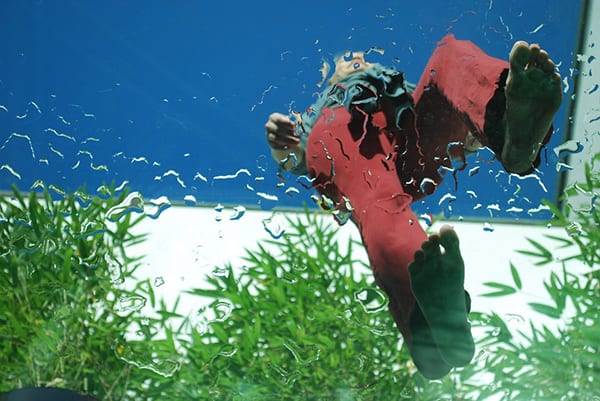
Reinvention Radio: The human spirit is pretty resilient. At some point, you’ve got to get back up on that horse and move forward.
The reality is I have done very well on some projects. In 2006, 2007, 2008, when things got pretty rough again in that world, I got hammered. Looking back on some of the buildings that I had. I had a beautiful 50,000 square foot office building right in downtown Chicago in the river north area. A beautiful heavy timber loft building. Electronic Arts, EA, the video game maker, they were our single tenant in that building. We had a triple net deal with that. They paid for everything. We owned the building. EA decided to close that headquarters. They paid a hefty sum to get out of there, but we couldn’t lease it back up. Unfortunately, we ended up giving that one back to the bank. That $4 million piece of property is probably about an $8 million to $9 million building right now. I had to give back a couple of other properties as well. Some nice pieces and some beautiful pieces as well that we didn’t have the capital to be able to sustain that downturn. Kept some, lost some, sold some at break even and looking back, some of those properties were awesome. There was some property that unfortunately I had to let go of and like you said, you live and you learn.
I appreciate you sharing that. I don’t think enough people or entrepreneurs share the down. A lot of people see nothing but the good stuff. They don’t see what’s going on under the water. We’re like ducks on top of the water. We may be still but underneath we’re paddling like crazy to override different things. That’s a kick in the balls when you have to go through that several times.
It doesn’t stop either because every time you drive by that damn thing, especially since a lot of real estate developers or investors that I know put some blood, sweat, and tears into those properties improving them. Oftentimes you take something that was meh and you make it beautiful. You’ve got your heart into it no matter how you slice it. People say don’t get emotionally invested in this and that. When you take something that wasn’t that great, and you make it into this beautiful piece of property, even though it’s a piece of real estate but it’s more than that. No matter how you slice it, you get emotionally tied to these things.
We call that the OTSC, “Oh, that’s so cute,” whether it’s a single-family home, apartment complex, mixed-use or whatever it is. It’s hard sometimes to keep your emotions out of it. Let’s talk a little about overcoming those hurdles. I’ve been through bad deals. I lot of people have been through bad deals. Not everybody jumps back into it or not been able to recover from that. What would you say has probably been the biggest help for you? Looking back a decade later, what were some of the things that helped you overcome those low points, to get back on your feet and reinventing yourself?
I wish it were that easy, but the reality is sometimes you got to wallow in it. If you take a big financial hit, it’s hard. I don’t think that people understand how hard it is, unless you’re an entrepreneur, to make a $100,000. Even though I’m making light of it in terms of, “That wasn’t a lot, but will I do that project today? Probably not.” To make $100,000 on something, that’s hard to do. For somebody to write you a check, it’s not like you work for ten years and you make this, and you put away $100,000 for ten years. You do something for a period of time maybe five months, six months whatever. Cash out through a refinance, you sell the property or whatever it is, and you have a check for $100,000. It’s hard to make a serious amount of money, like the life-changing type of money. It’s hard to do that. The reality is to some extent, you’ve got to grieve. You’ve got to sit there and recognize the fact that I’ve lost what some people won’t even make in a lifetime. That hurts no matter how you slice it. I do think you have to take an appropriate amount of time to grieve at some point. It could be a week later, a day later, six months later, a year later. The human spirit is pretty resilient. At some point, especially if you’ve got at least someone around you to give you that kick in the pants and say, “It happened, it sucks but we’ve got to move forward.” You’ve got to get back up on that horse.
Is that pain ever going to go away in terms of when you drive by it and you still have to see it? I don’t think it ever completely goes away. It becomes a game of, “I should have known better.” It becomes a game of, “I could have done better.” It becomes a game of, “I had my ego too big.” One of the properties that I’m referring to that we lost, I had an opportunity to sell that property and our partnership would have pocketed about $4 million. I didn’t think it was enough. Because I didn’t take that deal, that was the last window of opportunity to really make any money in hindsight on that deal. $4 million, that’s a lot of money no matter who you are. I don’t care if you’re a billionaire. $4 million is still a lot of money no matter how you slice it. We let our egos get in the way in some cases where we have an opportunity to do something, but we think more of what it is than reality presents to us. That’s where having someone who says, “You need to do that, whatever that is that you’re thinking you don’t need to do.” Having that support system to run some of these things by is huge because it’s that same support system that’ll help pull you out when you feel like, “I can’t do this anymore.”
Let’s transition a little bit. You put together an amazing event. I was honored that you invited me to the New Media Summit here in Austin, Texas in my backyard. It’s not often I get to attend an event in my backyard. Usually, it’s on the East Coast or West Coast. I love to ask how you came up with the concept for the New Media Summit. For those that don’t know, Steve puts on this amazing event. It’s a three-day event and one of the biggest things that I want to do being a podcaster and a lot of people out there are looking to help reinvent themselves, whether to get the word out and what they’re doing either locally or nationally or things like that.
I’m a big fan of podcasting. It’s one of the last, final untapped First Amendment frontier for you to get out and say what you want to say and get the message out. They were bringing in 150 people looking to get booked on shows or to boost up their podcasts for guests. You spend literally three days and a lot more beforehand diving in and helping develop these entrepreneurs to help them with their message. Where did you come up with the concept for this? It’s an awesome event and awesome way of helping launch so many great podcasters and podcast guests.
The New Media Summit, we did the first one in September of 2017. We’ve since done two others. Our fourth one is coming up here in February of 2019. The idea came to me via a partnership that I had with the gentleman years ago or so. He came to me with this idea, which was different within what the New Media Summit became. He was talking about how trying to do something in the new media space and everything was going on with influencer marketing at that point. He and I both had a couple of people that we knew, folks that we both were friends with, who did an event that was a pitch fest for traditional media. I’m happy to share the name of it. I love the Harrisons. I’ve learned under the Harrisons. Steve and Bill Harrison have an event that they do called the National Publicity Summit where they bring in radio and TV type people. I’ve been to that event and you can go there, you can pitch the radio on TV people and hopefully get booked on to their shows.
The number of bookings on those shows are pretty few and far between but some people get booked on CBS This Morning and that sort of thing. It’s a great event. Been to that event, my friend and I were talking. We were thinking about things from a different standpoint in terms of this whole new media world and influencer marketing and so on. I said to him at the time, “I don’t like the idea that you’re kicking out for that but let me throw this by you. What if we did an event that was similar to what the Harrisons do with the National Publicity Summit but we do it in the new media space? We bring in podcasters, we give podcasters the opportunity to find great guests for their shows and we give guests the opportunity to get booked on shows.” Unfortunately, that partnership fell apart for various reasons but I thought that the idea was good. I’ve been podcasting for as long as I’ve been podcasting, I know how many applications we get for people to be on Reinvention Radio or Beyond 8 Figures. I knew that the demand was there for people to get booked on shows. I look at podcast like thousands upon thousands of free stages. If you’re a speaker or you’ve got a mission and message to share or whatever, you need visibility.

Reinvention Radio: In business, you can be an introvert but it’s not going to work to hide by yourself.
You need to be able to get that message out to the masses and to do it through advertising can be very expensive. How can you get no cost visibility and share your mission and message with the masses without having to come out of pocket? One of the most effective ways to do that is through being a guest on podcasts. Knowing that I’ve got all of these folks coming to us and saying, “We’d love to be on your show,” then talking to some of my podcaster friends and knowing that they can continually get inundated with people saying, “We’d love to be on your show,” I thought it would be a good match for the attendees and the podcasters to come together and give the attendees the opportunity to pitch them on the spot and get booked. That’s how the New Media Summit was born.
It was by talking to a few podcaster friends and saying, “If I put together this event, would you open yourself up to sharing best practices, monetization strategies, how you’re leveraging the power of new media? Would you be willing to accept pitches from potential guests? No obligation to book them but if you like them, let’s find you some cool folks who you probably wouldn’t otherwise meet.” Before I knew it, we got 40 podcasters saying yes. I wanted to keep it somewhat intimate that everyone had an opportunity to pitch. We capped it at 150 attendees and that’s been the format ever since. It’s three days, 150 attendees and 40 icons of influencers as we call them and you’re one of them. You were there in Austin and you’ll be back at our next event as well. I’m looking forward to having you there. That’s the origin story of the New Media Summit.
It’s phenomenal. It’s like American Idol. You’ve got the seven or eight icons on the stage. People give their two-minute pitch. It’s the whole thing. We’ve got our backs turned, we liked the pitch, we’ll turnaround and book you and try to get you on. It’s been influential on what we’ve done here because we’ve had WDAY on here. We had Phoebe, Mo Check. We’ve got you. Sean Douglas is a keynote for our Note CAMP as well and brought so many great people together for International Podcast Day on September 30th too. It’s a great network and a lot of those people have become great friends that we look forward to hanging out. That’s the thing about three days, roundtables, rotating tables in the morning and the afternoons. You can be an introvert but it’s not going to work to hide by yourself.
I don’t let you hide. That’s one of the things that makes the event unique. All 150 attendees at some point over the three days have the opportunity to get the microphone, take center stage and speak in front of 190 people that are there. 150 attendees, 40 icons. It’s more because we’ve got vendors and then we livestream the event as well. We get thousands of people watching on the live stream. Everybody gets to take the mic. Everyone gets to pitch. I’m proud to say that we’ve got a 100% track record of people coming to the summit and getting booked. Everyone who comes to the summit leaves with at least one booking in hand and most with often dozens of visibility opportunities. One woman got booked on 33 shows at the last summit.
You never know who’s in the audience too besides the icons out there as well. That’s one of the big things that people take away. If we’re working in a career, we have a job. Maybe we’re not the pitch man. Maybe we’re not the person that’s going out there to promote ourselves. To start promoting your book, training, show you’ve got to take some speaker training. You got to spend some time developing those skills, flexing that muscle to build it up. You do a great job beforehand, working with them, helping them with their media, their one-sheets as well.
We do four pre-event training sessions before the summit so that people can practice their pitch and understand how to create a pitch that works. It’s hard condensing who you are and what you do and attract interest in two minutes. That’s what we do. We give people two minutes on the mic to share their story and even leave some time for feedback. You’d be amazed at where those pitches can go in a fairly short period of time. Some folks bring you to tears. Other folks will bring you to your feet and applaud. It’s crazy but we give you four pre-event training sessions to get your ready. We complete your media one sheet for you. My team builds that for you. It is a unique event from the standpoint of there are no iron curtains. There’re no VIP rooms, there’re no green rooms. The icons like Scott, the other podcasters, myself and others are all right there with you.
We all hang together. We all learn together. We all danced together. We all break bread together. Lunch is included every day. It’s a unique environment where you walk out of there after three days having developed real relationships with people that you may not have ever met before in your life before you walked in those doors. You’ve walked out of there with real relationships. The attendees walk out of there with real relationships and there’s something magical about what happens over those three days.
Kudos to you. It comes across, it’s very apparent. You’ve got a passion for helping people to see because you open up the Kimono. If they have a question about the event, booking, speaking, sales and things like that, you answer them and no holds barred on ensuring the information. It gives people a lot of insight not only are getting booked but monetization and then other opportunities there. A couple of the biggest things I took away is refining my pitch. I refined my pitches out to get booked. It’s helped me add some investment club meetings across the country from what I learned there as well. The next one’s going to be in Palm Harbor, Florida. February 21st through the 23rd.
Just outside of Tampa. We’re doing it at a place called the Innisbrook Resort. We’re thinking about maybe doing NMS Open before it starts there. Innisbrook is a nice golf and tennis resort and the whole nine. Bring the family. Let the family hang out and have some fun while you’re hanging out with us at the New Media Summit having some fun. Innisbrook Resort outside of Tampa, February 21st to the 23rd.
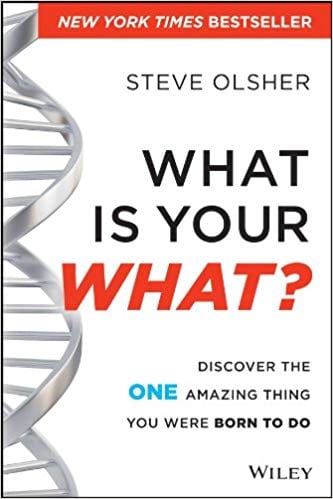
What Is Your WHAT?: Discover The One Amazing Thing You Were Born To Do
What’s the tuition to attend the New Media Summit?
Send me an email and we’ll hook you up. The published price is $29.97. If you went to NewMediaSummit.net, you’ll see the published price there of $29.97 but as a friend of Scott’s, send me an email at Steve@SteveOlsher.com. Send me an email and we’ll take care of you.
Free has no value for most people. What would you say is the biggest mistake you see from people looking to get themselves booked or pitch themselves to other people? What’s the biggest mistake?
They just to go too wide. They want to get booked on every show. For instance, if you go to NewMediaSummit.net, you’ll see a list of all the podcasters that will be there on their shows and whatnot. Do your homework, listen to their shows, make sure that it’s a fit, make sure you like them. Scott is not everybody’s cup of tea. I’m not everybody’s cup of tea. Even though on the surface, you might be like, “I’ve got to get on that show.” Then if you listen to it and you go, “I don’t like that guy.” That happens. Listen to the shows and create a hit list of the shows that you want. This applies to whether you come to the New Media Summit or not. Just create a hit list of the shows that you want to be on. It’s different when you’re pitching someone one-on-one. If you’re pitching someone one-on-one, like you’re sending an email to Scott and say, “I’d love to be on your show,” Scott gets inundated with requests just like all of our other podcaster friends. One of the things that I really like to do is have a killer subject line that gets their attention like, “You got it wrong in episode 86, Scott. Here’s why.” Something that shows that you’ve done your homework, you’ve listened, you get their attention.
Then in that pitch, you can reference, “In episode 286, you said X, Y and Z. Here’s my take on that subject.” You’re bringing your own unique slant to the table. Scott appreciates it because you’ve listened to the show. If you kick in the fact that, “Even though you got it wrong, I still left you a five-star review. Here’s a screenshot of that.” Then he’s going to be like, “They rated. They reviewed.” You’ve got to get into the mind of the podcaster. If you’re doing a one-on-one, make it so that it’s geared towards that particular show. In the New Media Summit environment where you’re pitching everyone, I still think you have to be clear on the message. If you can speak to business audiences and you can speak to personal development audiences and you can speak to health and fitness and you can speak to spirituality, it just becomes too broad and it becomes hard for us to know whether or not you’d be a good fit. It becomes hard for us to know how we can help you. If it’s not a fit for us, we can introduce you to others who have shows that you might be a good fit for. It’s just too broad, that’s what ends up happening.
It hits the nail on the head of narrowing down your niche and having different messages for different shows. If one message doesn’t work across the board, it waters down what you’re trying to do and you’ll lose out on that. One other thing that you mentioned that is prevalent at New Media is you keep everybody together. People get a chance to develop and talk with other people a little bit longer than in the one on 90 versus one-on-one. That was prevalent throughout the event. People are like, “I didn’t like your pitch, but I met you earlier throughout the weekend. I want to book you in my show anyway.”
That happens quite a bit. We’ve had some folks who are seasoned speakers come to the New Media Summit and they said that two minutes of having to pitch on who they are, what they do and why they’d be a good guest on a show was the most nerve-wracking presentation that they’ve ever had to give. Reality is it’s hard and it can be nerve-wracking. What often you find, as Scott is saying here, is you may not crush the pitch in the way that you want to but the truth is that you’re going to have lots of time over those three days to develop real relationships with the influencers that are there and you’ll get into other conversations. The pitch is the pinnacle of your opportunity to get booked and to put yourself out there in front of all the live streamers who are watching the thousands of people from across the world and so on. In terms of relationships, you’ll find that a lot of those relationships are developed and those pitches are accepted, “I get to know who you are and I didn’t love the pitch, but I love you,” kind of thing. That all happens at various points during out there in three days.
Steve’s got such a passion to find what your why is and what your what is out there that he wrote an amazing book.
What we’re talking about is What Is Your WHAT?: Discover the One Amazing Thing You Were Born to Do. That’s the book I put on the New York Times list in 2013. Coming full circle in terms of what we started this conversation around as far as reinvention is concerned, no matter where you are on the path, you can go further, or you can go in a different direction on a dime. This book, What Is Your WHAT?, helps you gain clarity on how you’re naturally wired to excel. It’s the book that I needed because I’ve struggled with that question or that phrase didn’t exist before I wrote the book, but I’ve struggled with the concept of, “How am I naturally wired to excel? Who am I most compelled to serve? What is my core gift? How am I going to share that gift?” That’s what the book, What Is Your WHAT?, does. It gives you an understanding of what your core gift is and then being able to identify the primary vehicle that you will use to share that gift and who the people are. Who are the people that you’re most compelled to serve? It’s the gift of the vehicle and the people that make up the What is Your WHAT? framework. I’m fortunate to be able to say that the book has helped tens of thousands, hundreds of thousands of people over the years. If you’re trying to figure out what’s next or what maybe puts more fire in your soul, it’s a great place to start.
It’s a great book that everyone should be reading out here. It’s a phenomenal book. Go out, buy it, read it, share it. Steve doesn’t take enough credit for how good a book it is, honestly. He’s very humble about it.
Just go to WhatIsYourWhat.com and you can grab a free copy of the entire book. We give away the whole book.
Steve, thank you so much for sharing such amazing nuggets, sharing about your past and reinventing herself, the ups and downs and things that happened out there. I look forward to hanging out with you. Once again, it’s a highly recommended event. You guys know I don’t usually recommend something unless I’ve been there and used it and found value from it. You want to check it out, the New Media Summit, February 21st, 22nd, 23rd. Drop Steve an email at Steve@SteveOlsher.com and he’ll hook you up with nice friends and family discount. Also go to the book site as well and you can download your free copy of it. Steve, thank you so much for joining us here on the Note Closers Show. We appreciate it so much.
I appreciate you.
Take care. Go out, take some action, don’t worry about the hurdles that are going to happen to all of us. Don’t be afraid to reinvent yourself. Sometimes, as Steve said, you’ve got to turn left when anybody else tells you to turn right. Go out, make something happen. Hopefully, we’ll see you at the New Media Summit. If not, we’ll see you all at the top.
Important Links
- Steve Olsher
- Beyond 8 Figures Podcast
- Reinvention Radio
- Liquor.com
- New Media Summit
- NewMediaSummit.net
- Steve@SteveOlsher.com
- What Is Your WHAT?: Discover the One Amazing Thing You Were Born to Do
- WhatIsYourWhat.com
- www.ReinventionRadio.com
About Steve Olsher
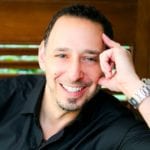
Steve Olsher is America’s Reinvention Expert and has taught thousands how to NICHETIZE!™ (nitch a tize) by identifying and monetizing their WHAT. Steve is the author of Internet Prophets: The World’s Leading Experts Reveal How to Profit Online and also of USA Book News’ Self-Help Book of the Year, Journey To You: A Step-by-Step Guide to Becoming Who You Were Born to Be.
He is the creator and host of Internet Prophets LIVE!; co-star of the groundbreaking film The Keeper of the Keys with Jack Canfield, John Gray, and Marci Shimoff; and has appeared on ABC TV, FOX TV, CNBC.com, and more than 200 radio shows including national programs hosted by Lou Dobbs, Jim Bohannon, and Mancow Muller.
Steve is a successful entrepreneur who’s applied his business acumen and communication skills to a wide range of endeavors. He has also earned the rank of brown belt in Brazilian Jiu-Jitsu, training under the late Carlson Gracie, Sr. All of his varied, real-world experiences have contributed to the concepts found in his award-winning books.

